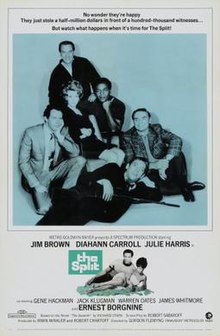
Lock, Stock and Two Smoking Barrels is a 1998 British crime film written and directed by Guy Ritchie. It follows a heist involving a confident young card sharp who loses £500,000 to a powerful crime lord in a rigged game of three-card brag, prompting him to pay off his debts by enlisting his friends to help him rob a small-time gang operating out of the apartment next door. It stars an ensemble cast featuring Jason Flemyng, Dexter Fletcher, Nick Moran, Jason Statham, Steven Mackintosh, Vinnie Jones, and Sting.
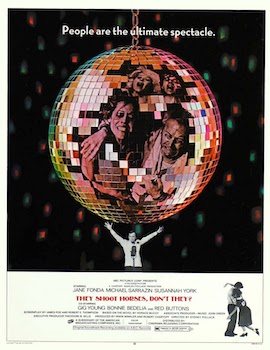
They Shoot Horses, Don't They? is a 1969 American psychological drama film directed by Sydney Pollack, from a screenplay written by Robert E. Thompson and James Poe, based on Horace McCoy's 1935 novel of the same name. It stars Jane Fonda, Michael Sarrazin, Susannah York, Gig Young, Bonnie Bedelia, and Red Buttons. It focuses on a disparate group of individuals desperate to win a Depression-era dance marathon and an opportunistic emcee who urges them on.
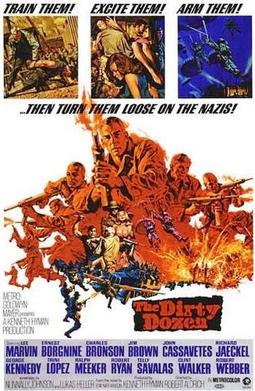
The Dirty Dozen is a 1967 American war film directed by Robert Aldrich and starring Lee Marvin with an ensemble supporting cast including Ernest Borgnine, Charles Bronson, Jim Brown, John Cassavetes, Richard Jaeckel, George Kennedy, Ralph Meeker, Robert Ryan, Trini Lopez, Telly Savalas, Donald Sutherland, Clint Walker and Robert Webber. Set in 1944 during World War II, the film follows the titular penal military unit of twelve convicts as they are trained as commandos by the Allies for a suicide mission ahead of the Normandy landings.
Parker is a fictional character created by American novelist Donald E. Westlake. A professional robber specializing in large-scale, high-profit crimes, Parker is the main protagonist of 24 of the 28 novels Westlake wrote under the pseudonym Richard Stark.
Irwin Winkler is an American film producer and director. He is the producer or director of over 58 motion pictures, dating back to 1967's Double Trouble, starring Elvis Presley. The fourth film he produced, They Shoot Horses, Don't They? (1969), starring Jane Fonda, was nominated for nine Academy Awards. He won an Oscar for Best Picture for 1976's Rocky. As a producer, he has been nominated for Best Picture for four films: Rocky (1976), Raging Bull (1980), The Right Stuff (1983), and Goodfellas (1990).

Point Blank is a 1967 American crime film directed by John Boorman, starring Lee Marvin, co-starring Angie Dickinson, Keenan Wynn and Carroll O'Connor, and adapted from the 1963 crime noir pulp novel The Hunter by Donald E. Westlake, writing as Richard Stark. Boorman directed the film at Marvin's request and Marvin played a central role in the film's development. The film grossed over $9 million at the box office in 1967 and has since gone on to become a cult classic, eliciting praise from such critics as film historian David Thomson.

Double Trouble is a 1967 American musical film starring Elvis Presley. The comedic plot concerns an American singer who crosses paths with criminals in Europe. The movie was #58 on the year-end list of the top-grossing films of 1967. Released on April 5, 1967, the film, Presley's twenty-fourth, was actually filmed before his twenty-third film, Easy Come, Easy Go, which was released two weeks prior on March 22, 1967.

The Thomas Crown Affair is a 1968 American heist film starring Steve McQueen and Faye Dunaway. Directed and produced by Norman Jewison, it was nominated for two Academy Awards, winning Best Original Song for Michel Legrand's "The Windmills of Your Mind". A remake was released in 1999.

The Badlanders is a 1958 American western caper film directed by Delmer Daves and starring Alan Ladd and Ernest Borgnine. Based on the 1949 novel The Asphalt Jungle by W. R. Burnett, the story was given an 1898 setting by screenwriter Richard Collins. It is the second film adaptation of the novel following 1950's The Asphalt Jungle.
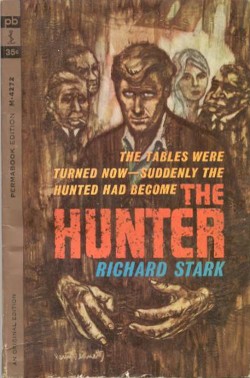
The Hunter (1962) is a crime thriller novel by American writer Donald E. Westlake under the pseudonym Richard Stark. It is the first of the novels featuring career criminal Parker.

The Strawberry Statement is a 1970 American drama film set in the counterculture and student revolts of the 1960s. The story is loosely based on the non-fiction book of the same name by James Simon Kunen about the Columbia University protests of 1968.
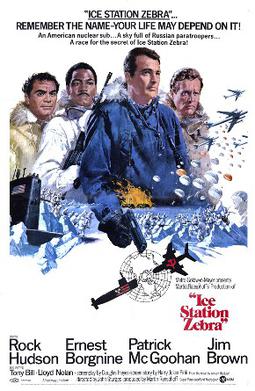
Ice Station Zebra is a 1968 American espionage thriller film directed by John Sturges and starring Rock Hudson, Patrick McGoohan, Ernest Borgnine, and Jim Brown. The screenplay is by Douglas Heyes, Harry Julian Fink, and W. R. Burnett, loosely based on Alistair MacLean's 1963 novel. Both have parallels to real-life events that took place in 1959. The film concerns a US nuclear submarine that must rush to the North Pole to rescue the members of the Ice Station Zebra.
Rocky is an American sports drama multimedia franchise created by Sylvester Stallone, based on the life of Chuck Wepner, which began with the eponymous 1976 film and has since become a cultural phenomenon, centered on the boxing careers of Rocky Balboa and his protégé Adonis Creed.
Irven LeRoy Spence was an American animator. He is best known for his work on MGM's Tom and Jerry animated shorts. Spence has been credited variously as Irven Spence, Irvin Spence, and Irv Spence.
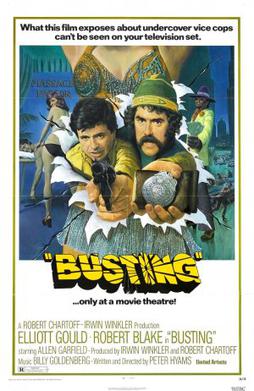
Busting is a 1974 American buddy cop film, directed by Peter Hyams in his theatrical directorial debut, starring Elliott Gould and Robert Blake as police detectives of the Los Angeles Police Department (LAPD). The film was the main inspiration for the cop series Starsky & Hutch, which premiered in 1975 and, like this film, also featured Antonio Fargas.
Gordon William Flemyng was a Scottish television and film director. He was also a writer and producer. He directed six theatrical features, several television films and numerous episodes of television series, some of which he also wrote and produced.

Ground Control (Jet) is a 1998 American disaster thriller film directed by Richard Howard and starring Kiefer Sutherland, Bruce McGill, Kristy Swanson, and Robert Sean Leonard. The film also features a cameo by former baseball player Steve Sax in the role of an airline co-pilot.

Cry Terror! is a 1958 American crime thriller film starring James Mason, Inger Stevens, and Rod Steiger. The story was written and directed by Andrew L. Stone. Neville Brand, Jack Klugman and Angie Dickinson appear in support.

Believe in Me is a 1971 American romantic drama film directed by Stuart Hagmann and written by Israel Horovitz. The film was produced by Robert Chartoff and Irwin Winkler.

Road House is a 2024 American action film that is a remake of the 1989 film Road House and stars Jake Gyllenhaal as an ex-UFC fighter who takes a job as a bouncer at a Florida Keys road house. The film is directed by Doug Liman, written by Anthony Bagarozzi and Chuck Mondry and produced by Joel Silver. It also stars Daniela Melchior, Conor McGregor, J. D. Pardo, Arturo Castro and Billy Magnussen.
